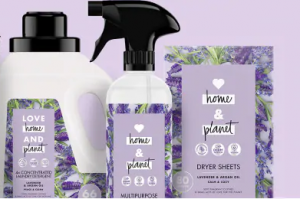The green trend in the personal care industry is permeating to the home care & cleaning products industry. Ecovia Intelligence sees a number of important initiatives introduced by home care brands and ingredient firms this year.

Most developments are occurring in green packaging. Growing consumer awareness of plastic pollution is leading personal care and home care brands to experiment with new packaging materials. In June 2017, P&G was the first to use ‘beach plastic’ in its Head & Shoulders shampoo packaging; the recycled beach plastic was then utilised in its Fairy liquid bottles. Henkel, Unilever, Ecover and SC Johnson have all since started using beach plastic in product packaging.
A number of personal care and home care brands have partnered with TerraCycle to launch the Loop platform. The circular shopping platform aims to make single-use packaging a thing of the past. Personal care and home care products, as well as food products, are delivered to consumer households and the waste packaging collected so it can be re-used. Loop has been launched in the US and France this year, and will be introduced in the UK and Canada.
As will be shown at the Sustainable Cleaning Products Summit, green ingredients are gaining currency in detergents and home care products. The personal care industry is already using an array of natural and sustainable materials in product formulations. Detergent and home care companies are looking at renewable feedstock to make green surfactants. Sustainable palm oil and coconut oil have been used for many years, however new sources are emerging. Croda recently launched its ECO range of bio-based surfactants. The surfactants are made from biomass and certified according to the USDA BioPreferred program.
The number of ethical labelling schemes for home care products is also rising. Natural standards like Ecocert and NPA are highly established, as are environmentally-friendly schemes like Green Seal and Nordic Swan. A new development is that new labels are being introduced to represent products not containing contentious ingredients. In 2018, the Environmental Working Group extended its EWG Certified label to home care products. The Made Safe label has also recently been extended to home care products.
Large consumer good companies are responding by developing greener lines. Last month, SC Johnson expanded its line of concentrated cleaning products. P&G has been a pioneer with its laundry detergents for cold water washes. Unilever has gone further by launching a dedicated brand of green home care products. The Love, Home and Planet was introduced a few months ago; the range of laundry, dish and surface cleaning products are made using plant-based ingredients and packaged in recycled plastic.
Ecovia Intelligence believes the green trend will continue to permeate the home care industry, influencing raw materials, formulations, packaging, as well as marketing of finished products. The question is whether brands should ‘green’ existing home care product lines, or start again and develop dedicated sustainable brands.
An update on green trends in the personal care and home care industries is regularly given at the Sustainable Cleaning Products Summit and Sustainable Cosmetics Summit
Posted: June 17th 2019
For permission to publish our research insights, please contact our media department

